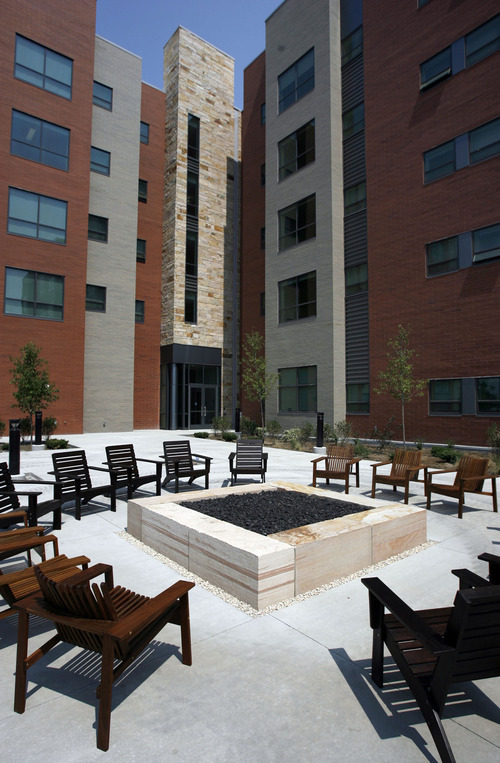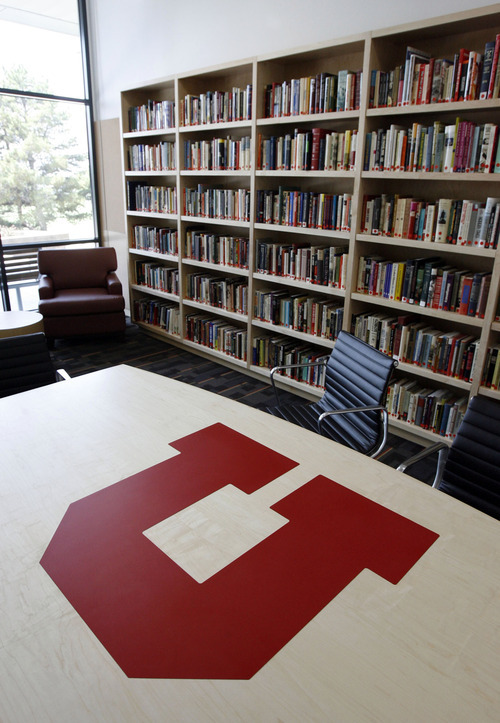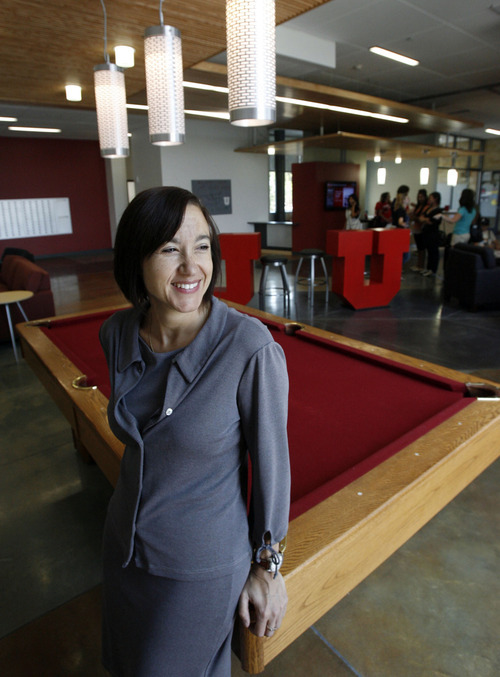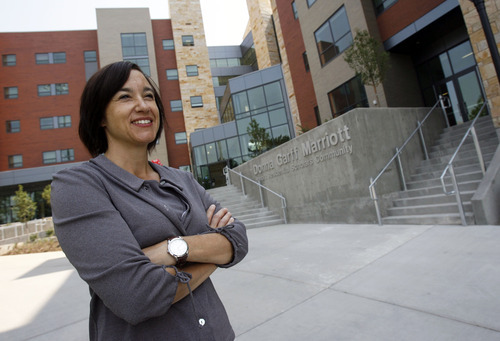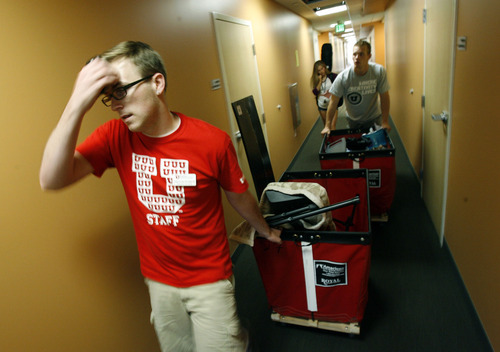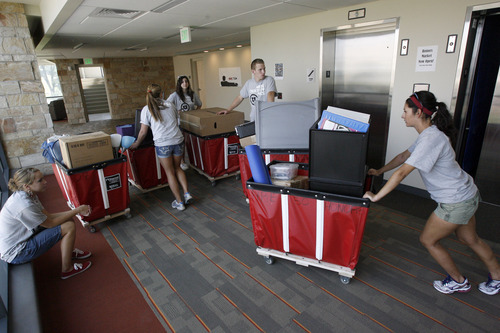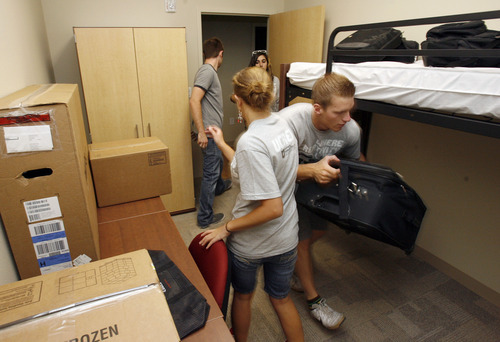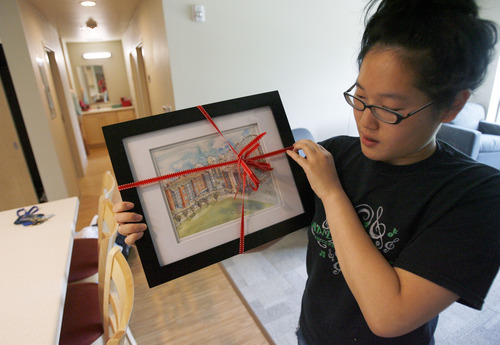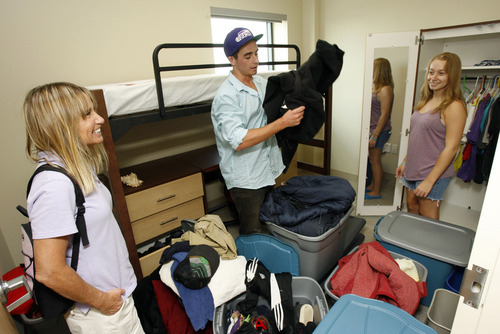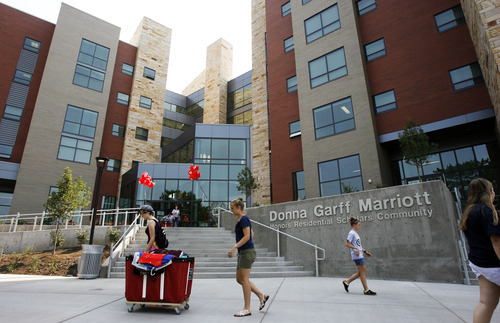This is an archived article that was published on sltrib.com in 2012, and information in the article may be outdated. It is provided only for personal research purposes and may not be reprinted.
Al Marchese was admitted to Middlebury College, a small liberal arts school in rural Vermont where he intended to enjoy small classes and play football.
But his educational path was diverted west by scholarship and job offers from the University of Utah. They were sweetened by 500 inches of annual snow in the nearby Wasatch Mountains and a seat in the Honors College, the U. program that tries to replicate a Middlebury experience on the campus of a major public research university.
"I really wanted that small-college atmosphere where I could really engage with faculty," Marchese said Thursday as he moved his belongings into the new Honors College residence hall, a five-story T-shaped building east of the Huntsman Center. The U. kicked off fall classes Monday.
Formally called the Donna Garff Marriott Honors Residential Scholars Community, the 309-bed building is the first in the state to integrate academic and residential life under one roof. Its Sept. 21 dedication will be a coming-of-age party for the program, now entering its 50th year.
During the past decade, it has seen tremendous growth under the leadership of architectural historian Martha Bradley, who was promoted last year to associate vice president for academic affairs. Enrollment has nearly tripled to 2,500 since 2002, when the program won status as a college under Bernie Machen's tenure as president and Bradley was named its first dean. Student body president Geneva Thompson and Truman scholar Ashley Edgette expect to graduate from the program this year.
—
'Engagement with the world' • Getting its first permanent home in Fort Douglas after the 2002 Winter Olympics helped the program flourish, Bradley said. Officials want to limit the Honors enrollment to 10 percent of the U.'s undergraduate population, a threshold it has already reached.
"We worked hard to diversify the population," Bradley said. "We raised the GPA to 3.5. It became an increasingly interesting group. When we made it more competitive to get in, the demand increased."
Students must apply by Feb. 1 and, starting next year, submit an essay.
"They tend to be talented, but, more important, they are motivated," said Sylvia Torti, who succeeded Bradley as dean. "Engagement with the world will be as important as grades."
Torti is a research biologist turned fiction writer who had been running the U.'s Rio Mesa field station near Moab. She has just finished her second novel, Bird Song, inspired by scientific research into birds.
The Honors degree requires completing seven courses, notably in writing and intellectual traditions, and producing a thesis containing original scholarly work. While honors programs are traditionally focused on the humanities, U. Honors students represent majors from all disciplines.
The U.'s signature feature is a yearlong seminar called Think Tank. Once a week, a group of 12 upperclassmen meet with distinguished U. faculty and community members to explore a pressing issue facing society. This year, Think Tanks will examine refugee communities, Wasatch water resources, aging and the tensions between law and medicine.
"Engaged learning experiences have become attractive to students," Torti said. "In addition to critical thinking and writing skills, they need the capacity to integrate across disciplines. Students these days really care about the world."
In the law and medicine group, philosophy professor Margaret Battin will team with medical professor Kirtly Parker Jones and 3rd District Judge Judith Atherton to discuss how the intersection of the medical and legal arenas has become "a fight club," and get students to think about how to resolve the tensions.
"We will ask them to think about people who commit crimes who are also mentally ill," said Battin, a nationally recognized medical ethicist. "Here is a case where the interests of law, exacting punishment and preventing future crime, appear to be at odds with the interests of medicine, which is helping someone with illness get well."
—
'Sky is the limit' • Difficulties have come with growth. A recent praise-filled review by the Graduate Council Review said students graduating with an Honors degree remain unacceptably low.
Marchese, a junior who hails from Scranton, Pa., is not sure he'll finish the program's requirements, although he wants to join a Think Tank his senior year.
"It would be nice to have 'honors' on my degree, but for me it's about the small classes with great professors," said Marchese, who is majoring in economics, works for the U. football program as a student manager and intends to go on to medical school.
Less than a third of the program's students graduate with the Honors degree, and the thesis requirement is a stumbling block.
According to Torti, the college is pairing students with mentors to keep them on track and insisting they begin planning their theses as sophomores, rather than waiting until the end of their junior year.
Torti believes the new building will help because it provides Honors students a 24-hour hub regardless of where they live, ensuring they stay connected with faculty and one another.
But just as important, according to Bradley, is connecting students to real-world challenges.
"It isn't just about the traditional liberal arts education. They are inspired to think of themselves as part of the community and experience individuals who are different from themselves," Bradley said. "These kids are capable of anything. You give them interesting work to do and the sky is the limit."
Meet an Honors graduate
Eduardo Reyes-Chavez, among the 100 University of Utah students who graduated with an Honors diploma in May, left a deep impression on faculty and fellow students.


